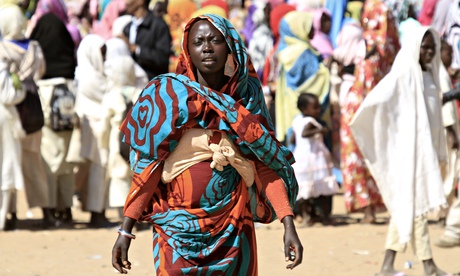Egypt & S. Sudan sign water cooperation agreement
Link to web article here.
November 22, 2014 (KHARTOUM) – The governments of Egypt and South Sudan signed on Saturday an agreement on technical and developmental cooperation in managing water resources.
 Egyptian media noted that this is the eighth agreement of its kind signed by Cairo with Nile Basin countries since 1902.
Egyptian media noted that this is the eighth agreement of its kind signed by Cairo with Nile Basin countries since 1902.The accord came on the sidelines of a visit to Cairo by South Sudan president Salva Kiir for talks with his Egyptian counterpart Abdel-Fattah al-Sisi.
Both countries agreed on the inauguration of ten water projects starting next month that are worth $26.6 million extended as a grant by Egypt.
Egypt’s water resources minister Hussam Maghazi told reporters after the signing ceremony that they emphasized their seriousness in continuing cooperation aimed at implementing bilateral development projects in line with a 2006 Memorandum of Understanding signed in Cairo and another one in 2011.
He also reiterated Cairo’s readiness to meet the development needs of South Sudan people especially in the fields of training and capacity building.
Maghazi noted one project planned for next year to clean Bahr al-Ghazal basin and build river anchors with a grant of $11.1 million.
He said that in accordance with the agreement, they will drill and equip 17 underground water wells worth $6 million and deliver four of them in a ceremony next January in Juba.
The Egyptian official also mentioned a $1 million agreement on the implementation of the technical and economic feasibility of the multi-purpose Wau dam project. He said that they completed all studies, designs, construction, civil and hydraulic power plant designs after which they will hold a regional workshop to review the final feasibility studies next January in Juba.
He went on to say that they will establish a central laboratory for the analysis of water and upgrading measurement stations of hydrological levels of the river Nile and build a pump to provide water to disadvantaged communities in southern Sudan.
Al-Masri al-Youm newspaper quoted unnamed official sources as saying that the accord includes 8 major items such as the establishment of a joint technical body to conduct periodic consultations on issues and projects of common interest, exchange of data and information, activating plans necessary to implement the procedures according to a uniform and shared vision of the two sides, conducting studies and research related to management and maintenance, conservation and development of water resources, environment, wildlife and plant ecosystems, climate change, demographic changes and fisheries, rehabilitating and creating new stations that execute water resources development plans.
The terms of the agreement also underscored the need to raise the level of cooperation between Cairo and Juba and exchange experiences through the establishment of a joint technical entity, similar to the one between Cairo and Khartoum, which is done through the Joint Technical Commission for Nile water.
(ST)
























